Xiu Tang
Learner-Tailored Program Repair: A Solution Generator with Iterative Edit-Driven Retrieval Enhancement
Jan 13, 2026Abstract:With the development of large language models (LLMs) in the field of programming, intelligent programming coaching systems have gained widespread attention. However, most research focuses on repairing the buggy code of programming learners without providing the underlying causes of the bugs. To address this gap, we introduce a novel task, namely \textbf{LPR} (\textbf{L}earner-Tailored \textbf{P}rogram \textbf{R}epair). We then propose a novel and effective framework, \textbf{\textsc{\MethodName{}}} (\textbf{L}earner-Tailored \textbf{S}olution \textbf{G}enerator), to enhance program repair while offering the bug descriptions for the buggy code. In the first stage, we utilize a repair solution retrieval framework to construct a solution retrieval database and then employ an edit-driven code retrieval approach to retrieve valuable solutions, guiding LLMs in identifying and fixing the bugs in buggy code. In the second stage, we propose a solution-guided program repair method, which fixes the code and provides explanations under the guidance of retrieval solutions. Moreover, we propose an Iterative Retrieval Enhancement method that utilizes evaluation results of the generated code to iteratively optimize the retrieval direction and explore more suitable repair strategies, improving performance in practical programming coaching scenarios. The experimental results show that our approach outperforms a set of baselines by a large margin, validating the effectiveness of our framework for the newly proposed LPR task.
Less is More: Adaptive Program Repair with Bug Localization and Preference Learning
Mar 09, 2025Abstract:Automated Program Repair (APR) is a task to automatically generate patches for the buggy code. However, most research focuses on generating correct patches while ignoring the consistency between the fixed code and the original buggy code. How to conduct adaptive bug fixing and generate patches with minimal modifications have seldom been investigated. To bridge this gap, we first introduce a novel task, namely AdaPR (Adaptive Program Repair). We then propose a two-stage approach AdaPatcher (Adaptive Patch Generator) to enhance program repair while maintaining the consistency. In the first stage, we utilize a Bug Locator with self-debug learning to accurately pinpoint bug locations. In the second stage, we train a Program Modifier to ensure consistency between the post-modified fixed code and the pre-modified buggy code. The Program Modifier is enhanced with a location-aware repair learning strategy to generate patches based on identified buggy lines, a hybrid training strategy for selective reference and an adaptive preference learning to prioritize fewer changes. The experimental results show that our approach outperforms a set of baselines by a large margin, validating the effectiveness of our two-stage framework for the newly proposed AdaPR task.
EchoPrime: A Multi-Video View-Informed Vision-Language Model for Comprehensive Echocardiography Interpretation
Oct 13, 2024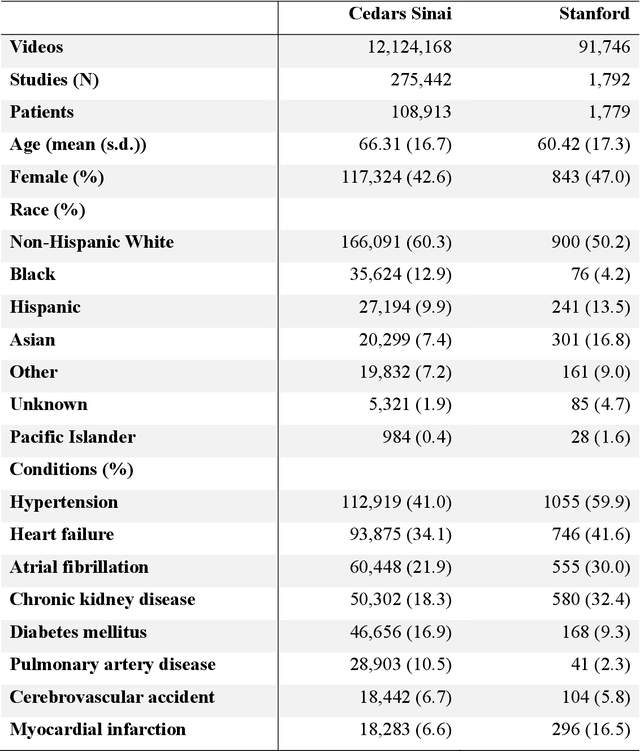
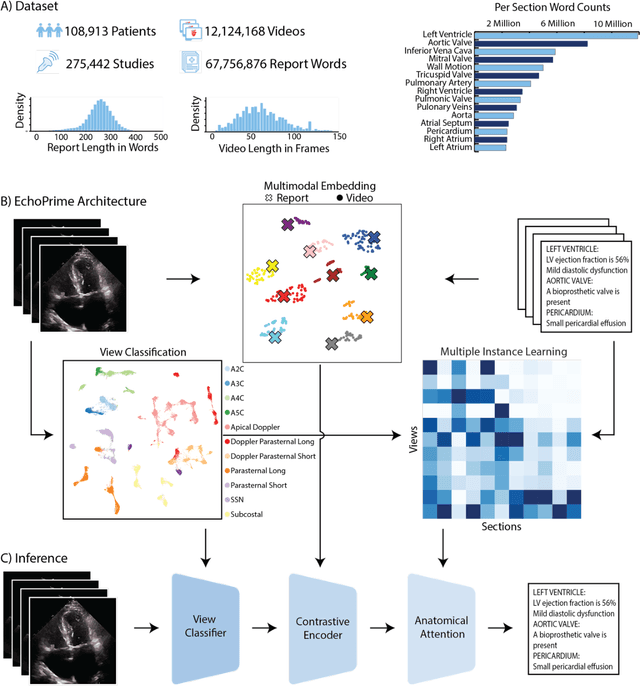
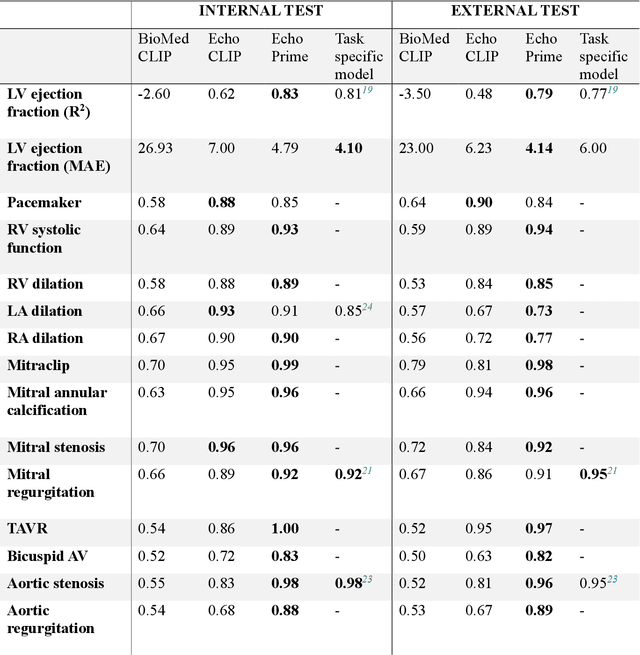

Abstract:Echocardiography is the most widely used cardiac imaging modality, capturing ultrasound video data to assess cardiac structure and function. Artificial intelligence (AI) in echocardiography has the potential to streamline manual tasks and improve reproducibility and precision. However, most echocardiography AI models are single-view, single-task systems that do not synthesize complementary information from multiple views captured during a full exam, and thus lead to limited performance and scope of applications. To address this problem, we introduce EchoPrime, a multi-view, view-informed, video-based vision-language foundation model trained on over 12 million video-report pairs. EchoPrime uses contrastive learning to train a unified embedding model for all standard views in a comprehensive echocardiogram study with representation of both rare and common diseases and diagnoses. EchoPrime then utilizes view-classification and a view-informed anatomic attention model to weight video-specific interpretations that accurately maps the relationship between echocardiographic views and anatomical structures. With retrieval-augmented interpretation, EchoPrime integrates information from all echocardiogram videos in a comprehensive study and performs holistic comprehensive clinical echocardiography interpretation. In datasets from two independent healthcare systems, EchoPrime achieves state-of-the art performance on 23 diverse benchmarks of cardiac form and function, surpassing the performance of both task-specific approaches and prior foundation models. Following rigorous clinical evaluation, EchoPrime can assist physicians in the automated preliminary assessment of comprehensive echocardiography.
Predicting post-operative right ventricular failure using video-based deep learning
Feb 28, 2021
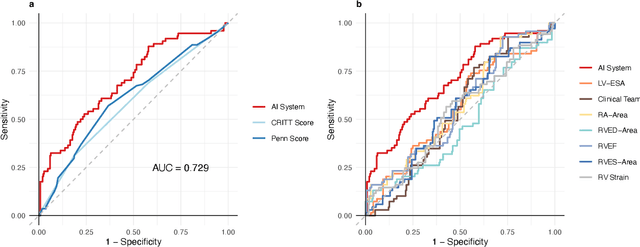
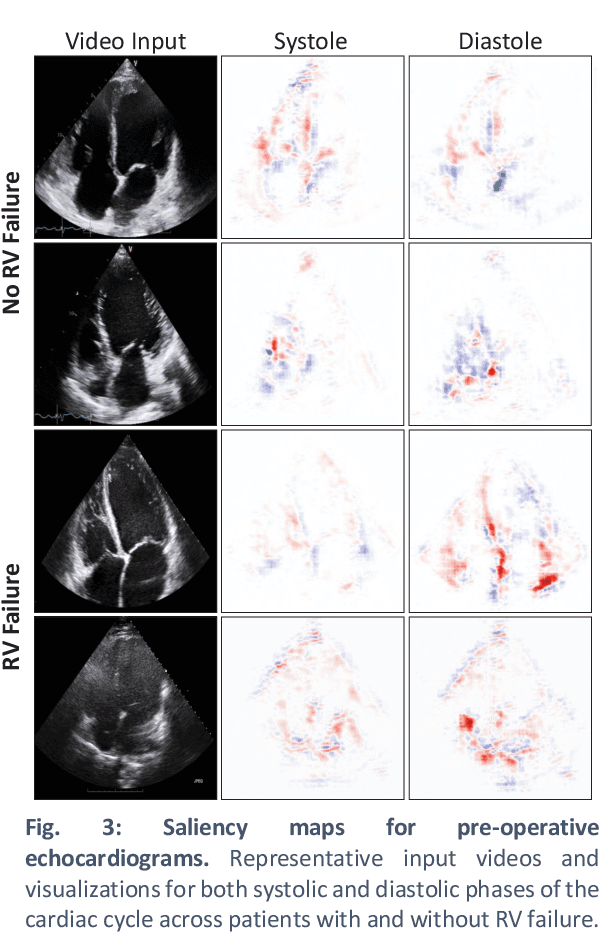
Abstract:Non-invasive and cost effective in nature, the echocardiogram allows for a comprehensive assessment of the cardiac musculature and valves. Despite progressive improvements over the decades, the rich temporally resolved data in echocardiography videos remain underutilized. Human reads of echocardiograms reduce the complex patterns of cardiac wall motion, to a small list of measurements of heart function. Furthermore, all modern echocardiography artificial intelligence (AI) systems are similarly limited by design - automating measurements of the same reductionist metrics rather than utilizing the wealth of data embedded within each echo study. This underutilization is most evident in situations where clinical decision making is guided by subjective assessments of disease acuity, and tools that predict disease onset within clinically actionable timeframes are unavailable. Predicting the likelihood of developing post-operative right ventricular failure (RV failure) in the setting of mechanical circulatory support is one such clinical example. To address this, we developed a novel video AI system trained to predict post-operative right ventricular failure (RV failure), using the full spatiotemporal density of information from pre-operative echocardiography scans. We achieve an AUC of 0.729, specificity of 52% at 80% sensitivity and 46% sensitivity at 80% specificity. Furthermore, we show that our ML system significantly outperforms a team of human experts tasked with predicting RV failure on independent clinical evaluation. Finally, the methods we describe are generalizable to any cardiac clinical decision support application where treatment or patient selection is guided by qualitative echocardiography assessments.
 Add to Chrome
Add to Chrome Add to Firefox
Add to Firefox Add to Edge
Add to Edge